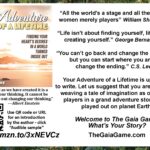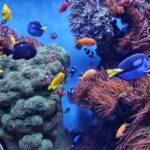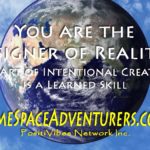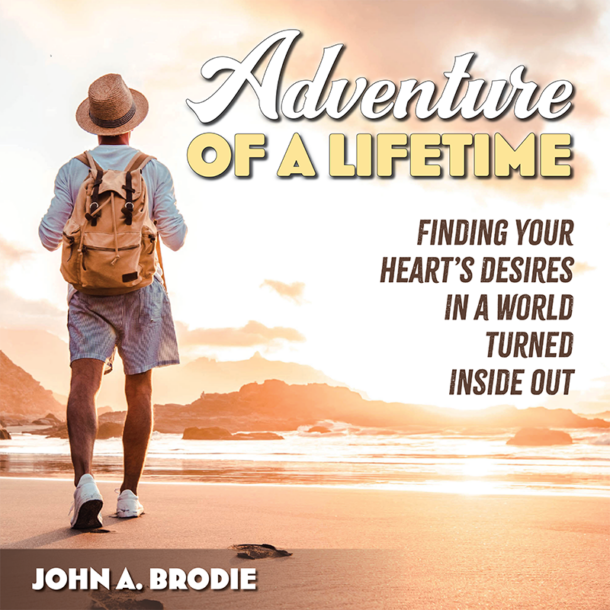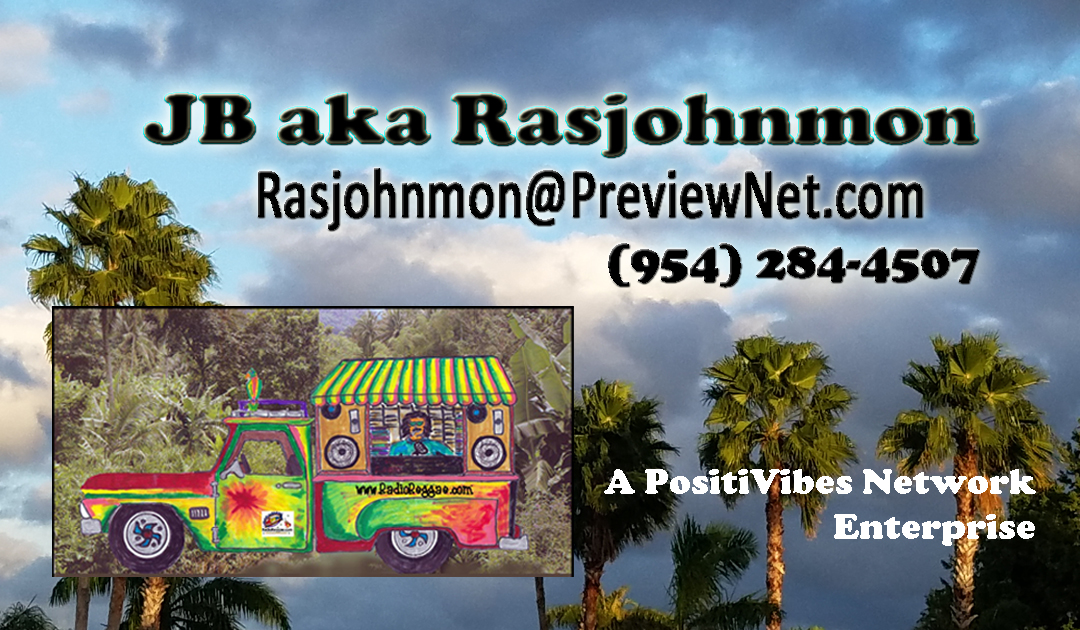 I often tell people that half of the world thinks I am a Rastafarian living in the Blue Mountains of Jamaica. It seems quite possible that in a former life something akin to that was my reality. I have lived a bit of a double identity. It all got started when in 1994 I got the chance to be Marketing Director of Reggae SumFest in Jamaica. Since having become a big time fan of Bob Marley and the genre starting back in 1973 at that NYC party, I had amassed a large collection of Reggae music. Through Westwood One I had gotten to know Timothy White, former Supervising Editor at Rolling Stone Magazine and author of a great biography of Marley, Catch a Fire, along with Roger Steffens who was to become the leading authority on Marley’s life and music. I had visited Jamaica a few times and had fun scouring local record shops for rare items and just loving the vibe of the Island.
I often tell people that half of the world thinks I am a Rastafarian living in the Blue Mountains of Jamaica. It seems quite possible that in a former life something akin to that was my reality. I have lived a bit of a double identity. It all got started when in 1994 I got the chance to be Marketing Director of Reggae SumFest in Jamaica. Since having become a big time fan of Bob Marley and the genre starting back in 1973 at that NYC party, I had amassed a large collection of Reggae music. Through Westwood One I had gotten to know Timothy White, former Supervising Editor at Rolling Stone Magazine and author of a great biography of Marley, Catch a Fire, along with Roger Steffens who was to become the leading authority on Marley’s life and music. I had visited Jamaica a few times and had fun scouring local record shops for rare items and just loving the vibe of the Island.
Now I was going to get an all access pass to the biggest Reggae Music Festival in the world. Talk about a musical dream come true for me. Here’s how magically things can fall into place when you are really just having fun and loving the process. I was also working with some people who were developing an Internet broadcasting system. Remember that this is 1994 and the Internet is really just beginning to be something that people are taking notice of. Coming out of my Westwood One background of broadcasting live concerts regularly via radio waves the idea appealed to me to see if we could send live audio over the Internet to an international audience. The first thing that came to mind for me was finding a cyberspace station location. On a whim, I decided to put in an application to secure the name REGGAE.COM. The fact that I got the name is one of the more magical things that has ever happened to me because it was to launch an entirely new storyline for me of Ras John (which has evolved into Rasjohnmon).
Here’s the story of Rasjohnmon:
This was many years ago. The birth of the dream was probably during a honeymoon in Oho Rios at the Playboy Club that has since had a few new incarnations with other resort names. The James Bond movie Dr. No had shot a bunch of scenes for the movie in the area and Ian Fleming’s house “Golden Eye” was further up the coast on this lush tropical island of Jamaica. Bob Marley was not yet on my radar but the Playboy Club had a wonderful piano player by their outdoor pool bar named Leslie Butler. His roots were with people like Billy Taylor, Bill Evans and Les McCann but the growing popularity of Reggae on the island was a big influence on all the local musicians. Leslie Butler’s Reggae infused jazz piano immediately took root in my heart and I would search out an album by him to take home with me – so that really was my first Reggae album and it all got started in a cocktail mixed with spies and Playmates under the tropical sun.
Here’s Rasjohnmon’s story…
Sometime later or was it earlier I flew into MoBay and set out for adventure. There was a Bob Marley tune and some laughter on the light breeze as I pulled up at an out of the way location many miles out of town. Glad to be off the main road, I parked the dinged up rental car in a dirt parking lot carved out of “da bush”. I had the 360 air conditioning of four rolled down windows letting in the cool night air as I took a last big draw from the spliff I had found in the ash tray. I wondered if all the rental cars came with one.
Dropping the spliff back in the ash tray for later, I looked out the open passenger window and nearly screeched out loud. A huge bird zoomed straight at me and landed on the car door sending a buffet of air into my face from its jagged wings. I had a sudden flashback to Alfred Hitchcock’s “The Birds” and my hand shot up to cover my eyes so they wouldn’t get peeked out. Then the bird spoke to me. “Who are you?” as I lowered my hand to take the bird in – it was big and green grey with a very sharp looking beak. The question seemed somehow to have great importance. “Who are you?” demanded the bird again. Feeling a little confused and uncertain I simply stared at the bird. “Who are you?” screeched the bird a third time and this time with a sudden inspiration I said “Rasjohnmon” and with that the bird flew away leaving me with the feeling that I was at another fork in the road.
I guess I came here in search of enlightenment. It was all very strange. In my head I sang “what a long strange trip it’s been” – the Grateful Dead song but to a Reggae beat. My growing collection of Reggae Music included the two “Fire on the Mountain” CD’s of Reggafied Dead tunes. There are said to be many roads to enlightenment and I had given up looking for a map. I was just going on instinct and possibly clouded perceptions. A little herb often helped. The important thing was that reality shifted in subtle ways so that you could no longer be certain that what you perceived at any moment was all there was to the world around you. Some people go through their whole life cock sure that their sense of what reality is is all there is. Anybody that does not see it their way is simply wrong. They are clearly not on the road to enlightenment. In fact, I was totally certain that anyone who thought they had all the answers was very likely mentally and spiritually deficient.
I had made a lot of twists and turns on the road I travelled and wasn’t at all sure of where I was going. I sure had a lot of questions seeking answers. Jah only knew why I thought I might find some answers way off the mainstream at this “Club Tropical” separated from the rest of the world and now feeling almost like being in a different dimension. Any of my friends would have felt it was pretty farfetched and that I was just going to chill out and party in the tropics. Well, if that was all it turned out to be, that would be fine too. It would just be one more little side trip. I sat back to collect my thoughts and calm myself down. I could hear lightly crashing waves in the distance and the rustle of the breeze through the dense tropical foliage. It was soothing after the bird incident and the rather harrowing drive from town on narrow twisting roads.
The car door creaked as I opened it sending some unseen creatures scattering in alarm. In the distance, I heard the opening bars of a song called “Celebrate Life”. It was a favorite of mine for the music and the message. I had seen the song’s creator, Lucky Dube, live several times. His performances were always a joy to behold. Lucky was from South Africa and his blend of African riddums with Reggae was infectious. His message, like Marley’s, was one of hope and the determination to rise above despair and the hardships of life. Both of them came out of often cruel societies. The apartheid in South Africa made things even worse for Lucky than Bob growing up in Trench Town, Jamaica. In Trench Town there was poverty and violence but not the extreme racial hatred and separation of South Africa.
I had never understood racial hatred. Particularly in the U.S., it was supposed to be “live and let live” – as long as you don’t try to impose your ideas on others or do anything that will cause them physical harm, you should be free to do what you want. Apartheid in South Africa was just one notch above outright slavery where a person could be “owned” as personal property with no personal rights to speak of. This was the world that Abraham Lincoln had saved the United States from with his Emancipation Proclamation that is took a Civil War to put in force. The Emancipation Proclamation, or Proclamation 95, was a presidential proclamation and executive order issued by President Abraham Lincoln on January 1, 1863. It changed the federal legal status of more than 3 million enslaved people in the designated areas of the South from slave to free.
Apartheid in South Africa didn’t go as far as making the ownership of fellow humans legal but it severely limited the civil rights of a whole group of people based on nothing more than skin color. It consisted of a body of laws giving a white minority the right to segregate, exploit and terrorize native Africans along with any people of mixed race. Lucky and his family had no human or political rights when he was growing up in the 60’s and 70’s. He was born on a small farm near the town of Ermelo which was a little over 100 miles from the capital of Johannesburg. He was raised by his grandmother and at six or seven started working in local gardens to help support his household. His grandmother eventually got him in school and it was in the school choir that the door to his future opened. Everyone liked Lucky and his sweet voice and the school became his refuge.
Lucky was attracted to Reggae music through the songs of Bob Marley and Peter Tosh among others. He heard the same cries for freedom and equality that he felt in his own heart. In his early live performances, the Reggae tracks got particularly strong responses and so, after a few albums of mostly traditional Zulu and Africaans styling, he locked in to a Reggae beat on “Think About the Children”. This was the politically tinged Reggae sound that Lucky would become famous for around the world while being shunned at home in “Apartheid” South African. His musical voice joined other rebel South African voices such as Nelson Mandela and the power of their message of hope and liberation chipped away at the roots of Apartheid. Lucky Dube took that message around the world and I went to see and hear his shows whenever he happened to perform near where I was. I saw him many times in NYC and a final time, a couple of years before he was killed. The last time I got to see him is one of my favorite live music experiences. Lucky and his band were in top form at a beach bar club in Fort Lauderdale, Florida on a beautiful tropical night. It was a magical night like tonight.
As I walked toward the entrance to The Club Tropical listening to Lucky’s “Celebrate Life”, I realized again the power of music to keep a message alive long after its creator had moved on. This was one of Lucky’s last songs and spoke about how we lived in a world of crazy people who often did terrible things but that we must not let that overwhelm us, we had to rise above it and “Celebrate Life”. Apartheid had been abolished. Lucky and his family had happily been able to return to South Africa where he was living with his family in Johannesburg as an international celebrity and cultural hero to his countrymen. Maybe it was because his mission had been accomplished, who knows, but ironically he was fatally shot in an attempt to steal his car after dropping a couple of his children off at their uncle’s house. Here he was, back in his homeland as a truly free man and then gone, just like that. I figured Lucky had sure scored some Karmic points with what he had given the world. His message of celebrating life had always come through loud and clear for me and many others. I thought it would be nice if a lot of people who had far less trauma in their lives would get that message and help spread it.
A stone walkway lit by flaming torches on tall poles lead from the edge of the dirt clearing where I had parked to the open entrance to the club. Lucky’s voice singing “Celebrate Life” rose above the sounds of talking, laughter and clanking of glasses and dishes – it brought a smile to my face. I looked around and figured this was a pretty good place to celebrate life for a few hours at least. I saw an empty table by a window looking out toward the beach and took a seat. There were a couple of dozen other people there, spread out between the bar that extended out to an open air deck and the other tables. An unoccupied stage was at the inside end of the room where I was sitting. I could easily picture Lucky playing there in my mind’s eye. The walls were covered with all kinds of musical mementos from framed LP’s to photos, posters and ticket stubs. The floors were smooth and shiny, I imagined from plenty of dancing feet. Big bamboo fans turned lazily from the ceiling.
As I was taking it all in, a short dark skinned girl in shorts and a bikini top came over to me and said, “Welcome back”. I thought for a minute trying to remember if I possibly could have been here before and then said, “Thanks”. The girl said, “You gonna have a nice cold Red Stripe?” – I said sure. Lot’s of Rastas didn’t drink alcohol at all but Red Stripe was still the official beer of Reggae being the main brew in Jamaica. Moments later, she brought the Red Stripe and I sat back and took a sip. I was suddenly totally exhausted and I kind of drifted off.
It turns out that this was actually my club but no one actually knew that I was Rasjohnmon at this point. With very few exceptions, people just assumed he was a dark skinned Rasta with long dreads from the Blue Mountain area of JA not far from where Bob Marley was born. I happened to be a nicely tanned but rather light skinned guy originally from New Jersey. The Club Tropical was a retreat for me and a good cyberspace home. Rasjohnmon was known to most people through my internet website, REGGAE.COM (now RadioReggae.com or Rasjohnmon.com) which is based at the Club.
This would be my base for a continuing mission to spread PositiVibes with a focus on the Inity (or oneness) of the human family and of all of Creation. For many years Reggae.com had over a million visitors a week which gave me a huge audience to try and deliver a positive “upful” message to the world. With the positive Reggae vibe as a backdrop, I promoted the Bob Marley “One Love” vision. I encouraged people to never lose hope about where their lives could take them and to realize that we are all in this adventure together with fear and hate our biggest enemies. The beauty of having the Internet as a platform is that it gives you even greater freedom to create the character you want presented to the world. The fact that most of the Internet audience never really knew the color of my skin gave me the ability to speak to everyone and be listened to as a peer.
Rasjohnmon has always promoted the belief that each of us can create the future we want for ourselves regardless of what current appearances might indicate. I shared “positive” thoughts of inspired individuals like Deepak Chopra, Denis Waitley, Richard Bach, the Dali Lama, Les Brown and Marianne Williamson. The “PositiVibes” page as it would come to be known was a popular destination for cyberspace travelers. It was filled with little spinning book icons that each would reveal a different quote when clicked on. Having my own platform for promoting love, world peace and unity gave me great satisfaction. I would get messages from people all over the world thanking me for lifting their Spirits with the music and words on the site. It shows the advantage of being “color blind” and the truth of the adage that “you can’t tell a book by its cover”. Everyone could just “assume” I was whatever they wanted me to be and it let their hearts and minds better accept the positive ideas without being stopped by any firewall of preconceived notions. The cyber world had the image of The Club Tropical before it even formed – an oasis away from the turmoil of so much of the world where there was nothing but hope, love and sense of joyous adventure Imagineering a better world. Here’s the magical part: that is exactly how you intentionally Design Reality.
I know that it is still difficult to look at the world around us and really accept that it is all totally based on a series of decisions about how to think about the world. From birth we have learned to become very good translators of the vibrations around us. Our ego basic operating system believes that whatever it perceives – an object based reality – is real and it conceives the future based entirely on what it believes about the past and present moment. So the “secret” really is to quit worrying about all the “un-wanted” that seems to be going on and do more dreaming up of realities you want to live in. Those dreams will be yours for the asking if you allow them to flow into your reality by believing in them. Like Dorothy getting back from Oz, all she had to do was tap her heels together and believe “there’s no place like home, there’s no place like home”. What’s real and what’s illusion? It’s all in your mind and imagination – and most important, you have the power to decide what you are going to do and who you are going to be.
By the way, the Reggae SumFest adventure was everything I had imagined it would be. I shared a house in the Iron Hills section of Montego Bay looking down at the beautiful Caribbean in the distance. The house was spacious and came with a staff to cook and care for us during our stay. I was there with the show exec producer and a couple of the heads of the production team. We didn’t get a lot of time to spend at the house but it was sure enjoyable when we were there. I had my own driver to get me back and forth to the venue and keep an eye on me to make sure no one gave me any trouble.
There was some turmoil – not everyone goes through life with a persistent positive attitude – and I got the opportunity to play peacemaker which is a role I often seem to fall into. Being genuine and focused on positive outcomes for everyone involved usually has a way of moving things in the right direction. So with state-of-the-art recording equipment courtesy of Disney who wanted to field test a new all digital mobile recording studio and a camera crew mostly made up of MTV people from NY, we captured four days of great musical performances in spectacular quality. No Problem Mon! Only thing, our Jamaican show producers had neglected to get artist releases before the show so none of the material could be made commercially available. Luckily Rasjohnmon found a copy of most of the audio that you can listen to on-line at RadioReggae.com.


